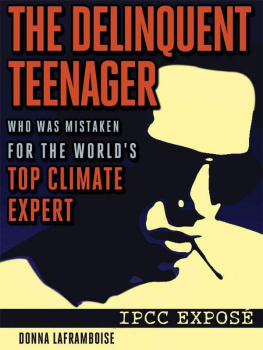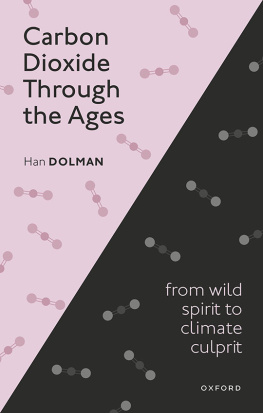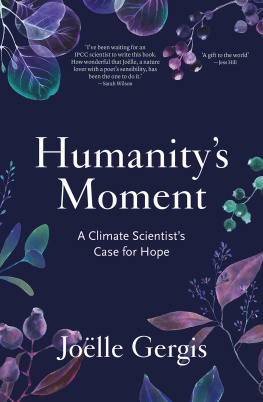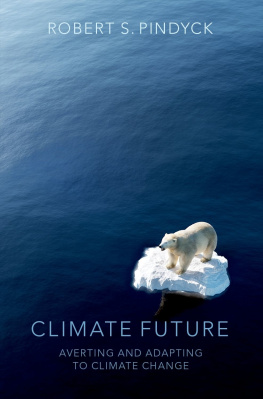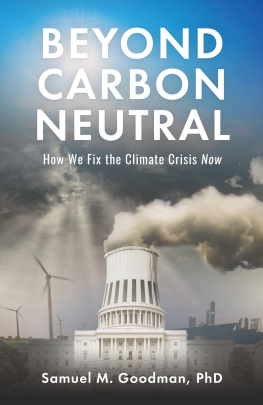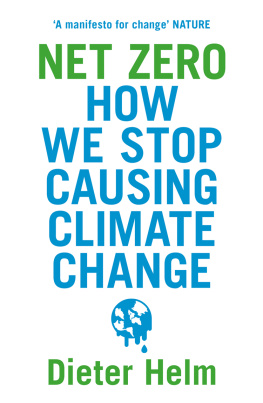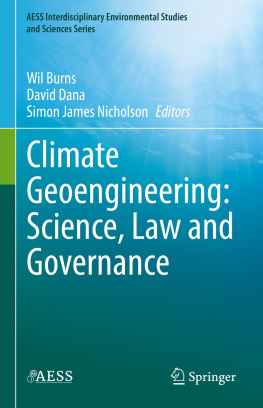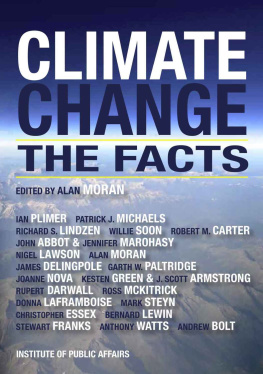The Delinquent Teenager
who was mistaken for the world's top climate expert
2011 by Donna Laframboise
ISBN: 978-1-894984-06-5
Ivy Avenue Press, Toronto, Canada
IvyAvenue.com
The following expos of the Intergovernmental Panel on Climate Change was written by an investigative journalist and is the product of two years of research. Learn .
Clicking on a footnote will bring you to additional commentary within this book. (Pressing your Back button returns you to the main text.) Hundreds of additional links have also been included. Clicking one of these usually takes you beyond these pages and out onto the Internet. You may find it more convenient to explore such links by viewing this book from within Kindle Cloud Reader software on your desktop, laptop, or tablet computer.
There are no real experts, only people who understand their own little pieces of the puzzle. The big picture is a mystery...
- Danny Hillis, Millennium bug skeptic, Newsweek , May 1999
Science is a mosaic of partial and conflicting visions.
- Freeman Dyson, The Scientist as Rebel , 2006
Table of Contents
This book is about a spoiled child. Year after year, this child has been admired, flattered, and praised. There has been no end of self-esteem-building in his life. What there has been little of, though, is honest feedback or constructive criticism.
When we're young, our parents ensure that we confront our mistakes. When our ball shatters a neighbor's window we're required to apologize - and to help pay for a replacement. What happens, though, if a child is insulated from consequences? What if he hears his parents tell the neighbor that because he's special and precious he hasn't done anything that wrong by trampling the neighbor's flower bed?
The answer is obvious. A child who is never corrected is unlikely to develop self-discipline. A child whom everyone says is brilliant feels no need to strive for excellence. Nor does he have much hope of developing what, in this tale, is the most important quality of all: sound judgment.
The child at the center of this book was brought into the world by two United Nations bodies - one focused on the weather, the other on the environment. Called the Intergovernmental Panel on Climate Change - IPCC for short - this child arrived more than 20 years ago. []
Notice that the word intergovernmental is part of its name. This means that every country that chooses to send delegates to infrequent meetings is a godparent of the IPCC. Any child with over 100 godparents is bound to be spoiled. Even when he torments small animals there will always be those who think he can do no wrong.
Which means that disciplining this child is next to impossible.
Having morphed into an obnoxious adolescent, the IPCC is now everyone's problem. This is because it performs one of the most important jobs in the world. Its purpose is to survey the scientific literature regarding climate change, to decide what it all means, and to write an ongoing series of reports. These reports are informally known as the Climate Bible.
The Climate Bible is cited by governments around the world. It is the reason carbon taxes are being introduced, heating bills are rising, and costly new regulations are being enacted. It is why everyone thinks carbon dioxide emissions are dangerous.
Put simply: the entire planet is in a tizzy because of a UN report. What most of us don't know is that, rather than being written by a meticulous, upstanding professional in business attire, this report was produced by a slapdash, slovenly teenager who has trouble distinguishing right from wrong.
For now, let us consider just one example. In the grown-up world, whenever important decisions and large amounts of money are involved conflict-of-interest mechanisms are firmly in place. Lawyers, accountants, politicians, and many others are subject to these rules as a matter-of-course. People who expect to be trusted by the public adopted them long ago.
Yet even though the IPCC is one of the world's most influential bodies, and even though it evaluates matters in which trillions of dollars are at stake, well into the 21st century it saw no need to even discuss conflict-of-interest. This organization is so arrogant, so used to being fawned over, that its leaders failed to take the most ordinary of precautions.
The IPCC has lounged, for more than two decades, in a large comfy chair atop a pedestal. When the IPCC is mentioned in broadcasts, newspapers, and books it is portrayed as a paragon of scientific truth and authority. Here are some direct quotes from people describing the IPCC:
- phenomenally successful
- a remarkable history of accomplishments
- there is not a parallel on this planet, in any field of endeavour
- its place in the history books is clear
- if the IPCC says something, you had better believe it []
Journalists are among the IPCC's most ardent admirers. They say the Climate Bible is written by thousands of the world's top experts who all agree with its conclusions. They routinely use words such as gold standard , authoritative , and pre-eminent to describe it. Indeed, when discussing the IPCC the media sound more like cheerleaders than hard-nosed reporters:
- the IPCC...has shown us the way ( Time magazine)
- It is chapter and verse, it is Holy Writ (Irish Independent )
- most scientists have been awed by the IPCC's deliberate work ( New York Times )
- The greatest feat of global scientific cooperation ever seen...utterly unique and authoritative (UK Guardian ) []
In 2007, the Nobel committee joined the chorus of praise singers and crowned the IPCC with a Nobel Peace Prize. During his presentation speech, the Nobel chairman thanked the IPCC for its "outstanding scientific work" and for all it has done "for mother earth." According to the Nobel committee, although it was once unclear whether human activities were causing global warming, "Thanks to the IPCC there is very little such doubt today."
If you know a bit about history, though, that Nobel speech may have left you uneasy. This is how it ended: "Action is needed now. Climate changes are already moving beyond human control." []
Let us be sensible for a moment. Planet Earth is 4.5 billion years old. During that time it has endured all sorts of perfectly natural climate transformations. As recently as 20,000 years ago 97% of Canada was covered by ice. [] That ice melted and retreated and the Ice Age ended all on its own. The Egyptian pharaohs, remember, only came into the picture 5,000 years ago, while the Romans ruled 2,000 years ago. To suggest that the climate has ever been within human control is surely a bit silly.
Mark Twain once observed that:
...people's beliefs and convictions are in almost every case gotten at second-hand, and without examination, from authorities who have not themselves examined the questions at issue but have taken them at second-hand from other non-examiners, whose opinions about them were not worth a brass farthing.
If Twain were alive today, he might have sharp words for all the hype surrounding the IPCC. Twain was talking about religion and politics when he made the above remarks and, for some people, environmentalism has become a substitute religion. It is their worldview, the lens through which they interpret everything. Moreover, because the IPCC is a child of the United Nations - the stage on which so many of the world's power blocs jostle with one another - whether we like it or not the IPCC is also mixed up with politics.
It has long been fashionable to be green. For half a century we've taught our children that the planet is fragile, that humans treat it carelessly, and that we are on the brink of ecological disaster. Smart individuals armed with plenty of facts and figures argue that the opposite is actually the case. They say the state of the world is steadily improving, that it's becoming cleaner and healthier. But their voices barely register.

